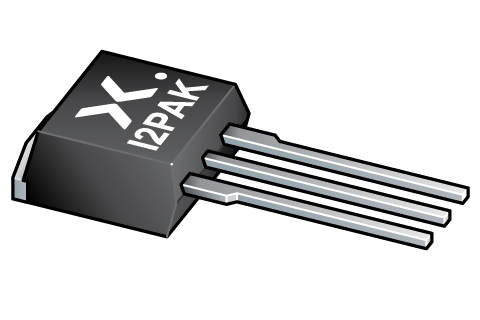
Register once, drag and drop ECAD models into your CAD tool and speed up your design.
Click here for more informationBUK7E8R3-40E
N-channel TrenchMOS standard level FET
Standard level N-channel MOSFET in a SOT226 package using TrenchMOS technology. This product has been designed and qualified to AEC Q101 standard for use in high performance automotive applications.
Features and benefits
- AEC-Q101 compliant
- Repetitive avalanche rated
- Suitable for thermally demanding environments due to 175 °C rating
- True standard level gate with VGS(th) rating of greater than 1 V at 175 °C
Applications
- 12 V Automotive systems
- Motors, lamps and solenoid control
- Start-Stop micro-hybrid applications
- Transmission control
- Ultra high performance power switching
Parametrics
| Type number | Package version | Package name | Product status | Channel type | Nr of transistors | VDS [max] (V) | RDSon [max] @ VGS = 10 V (mΩ) | Tj [max] (°C) | ID [max] (A) | QGD [typ] (nC) | QG(tot) [typ] @ VGS = 10 V (nC) | Ptot [max] (W) | Qr [typ] (nC) | VGSth [typ] (V) | Automotive qualified | Ciss [typ] (pF) | Coss [typ] (pF) | Release date |
|---|---|---|---|---|---|---|---|---|---|---|---|---|---|---|---|---|---|---|
| BUK7E8R3-40E | SOT226 | I2PAK | End of life | N | 1 | 40 | 7.4 | 175 | 75 | 7.4 | 24 | 96 | 10.7 | 3 | Y | 1300 | 260 | 2012-09-06 |
Package
All type numbers in the table below are discontinued.
| Type number | Orderable part number, (Ordering code (12NC)) | Status | Marking | Package | Package information | Reflow-/Wave soldering | Packing |
|---|---|---|---|---|---|---|---|
| BUK7E8R3-40E | BUK7E8R3-40E,127 (934066418127) |
Withdrawn / End-of-life | BUK7E8R3 40E |

I2PAK (SOT226) |
SOT226 | Not available |
Environmental information
All type numbers in the table below are discontinued.
| Type number | Orderable part number | Chemical content | RoHS | RHF-indicator |
|---|---|---|---|---|
| BUK7E8R3-40E | BUK7E8R3-40E,127 | BUK7E8R3-40E |
|
|
Series
Documentation (20)
| File name | Title | Type | Date |
|---|---|---|---|
| BUK7E8R3-40E | N-channel TrenchMOS standard level FET | Data sheet | 2017-04-20 |
| AN10273 | Power MOSFET single-shot and repetitive avalanche ruggedness rating | Application note | 2022-06-20 |
| AN10874_ZH | LFPAK MOSFET thermal design guide, Chinese version | Application note | 2020-04-30 |
| AN11113_ZH | LFPAK MOSFET thermal design guide - Part 2 | Application note | 2020-04-30 |
| AN11156 | Using Power MOSFET Zth Curves | Application note | 2021-01-04 |
| AN11158 | Understanding power MOSFET data sheet parameters | Application note | 2025-02-18 |
| AN11158_ZH | Understanding power MOSFET data sheet parameters | Application note | 2021-01-04 |
| AN11160 | Designing RC Snubbers | Application note | 2024-10-21 |
| AN11172 | Mounting instructions for SOT78 (TO-220AB); SOT186A (TO-220F) | Application note | 2021-05-21 |
| AN11243 | Failure signature of Electrical Overstress on Power MOSFETs | Application note | 2025-03-20 |
| AN11261 | RC Thermal Models | Application note | 2021-03-18 |
| AN11599 | Using power MOSFETs in parallel | Application note | 2016-07-13 |
| AN90063 | Questions about package outline drawings | Application note | 2025-03-12 |
| SOT226 | 3D model for products with SOT226 package | Design support | 2017-06-30 |
| Nexperia_package_poster | Nexperia package poster | Leaflet | 2020-05-15 |
| SOT226 | plastic, single-ended package (I2PAK); 3 terminals; 2.54 mm pitch; 11 mm x 10 mm x 4.3 mm body | Package information | 2020-04-21 |
| BUK7E8R3-40E | BUK7E8R3-40E Spice model | SPICE model | 2012-10-05 |
| TN00008 | Power MOSFET frequently asked questions and answers | Technical note | 2024-08-09 |
| BUK7E8R3-40E_RC_Thermal_Model | BUK7E8R3-40E Thermal design model | Thermal design | 2021-01-18 |
| BUK7E8R3-40E | BUK7E8R3-40E Thermal model | Thermal model | 2012-10-08 |
Support
If you are in need of design/technical support, let us know and fill in the answer form we'll get back to you shortly.
Longevity
The Nexperia Longevity Program is aimed to provide our customers information from time to time about the expected time that our products can be ordered. The NLP is reviewed and updated regularly by our Executive Management Team. View our longevity program here.
Models
| File name | Title | Type | Date |
|---|---|---|---|
| BUK7E8R3-40E | BUK7E8R3-40E Spice model | SPICE model | 2012-10-05 |
| BUK7E8R3-40E_RC_Thermal_Model | BUK7E8R3-40E Thermal design model | Thermal design | 2021-01-18 |
| BUK7E8R3-40E | BUK7E8R3-40E Thermal model | Thermal model | 2012-10-08 |
| SOT226 | 3D model for products with SOT226 package | Design support | 2017-06-30 |
How does it work?
The interactive datasheets are based on the Nexperia MOSFET precision electrothermal models. With our interactive datasheets you can simply specify your own conditions interactively. Start by changing the values of the conditions. You can do this by using the sliders in the condition fields. By dragging the sliders you will see how the MOSFET will perform at the new conditions set.